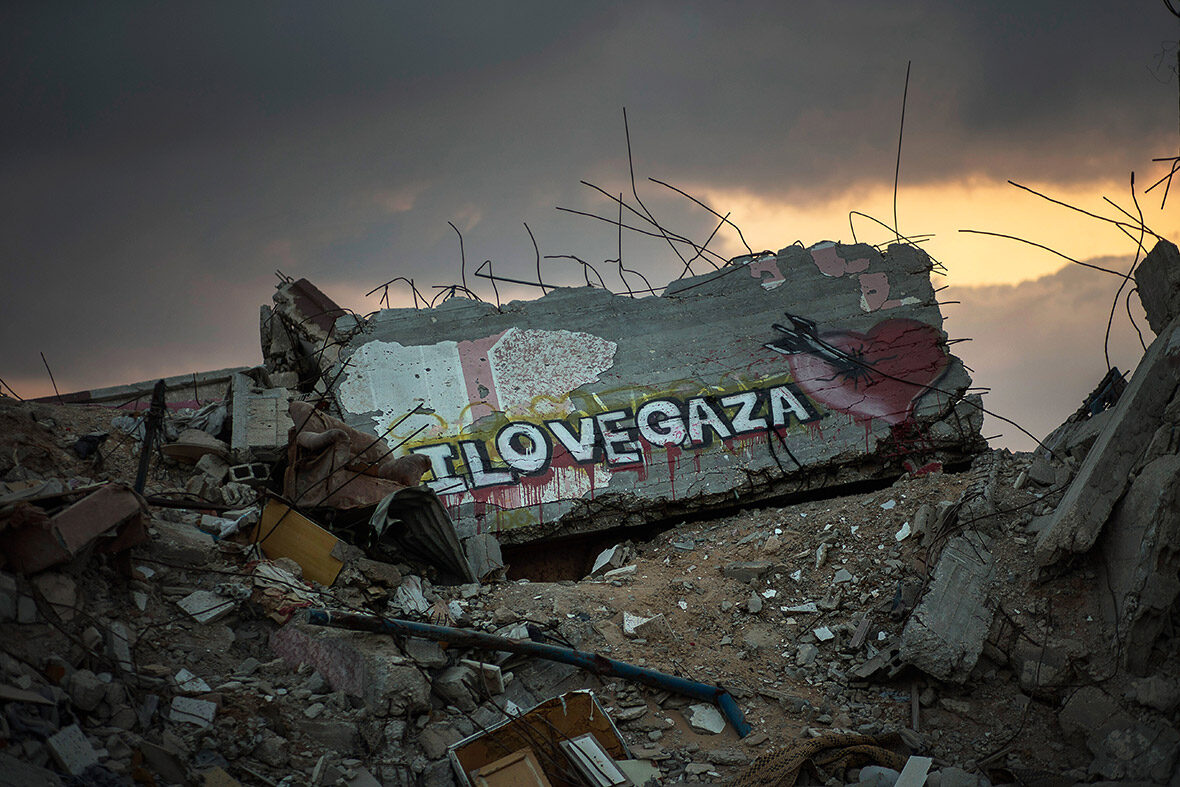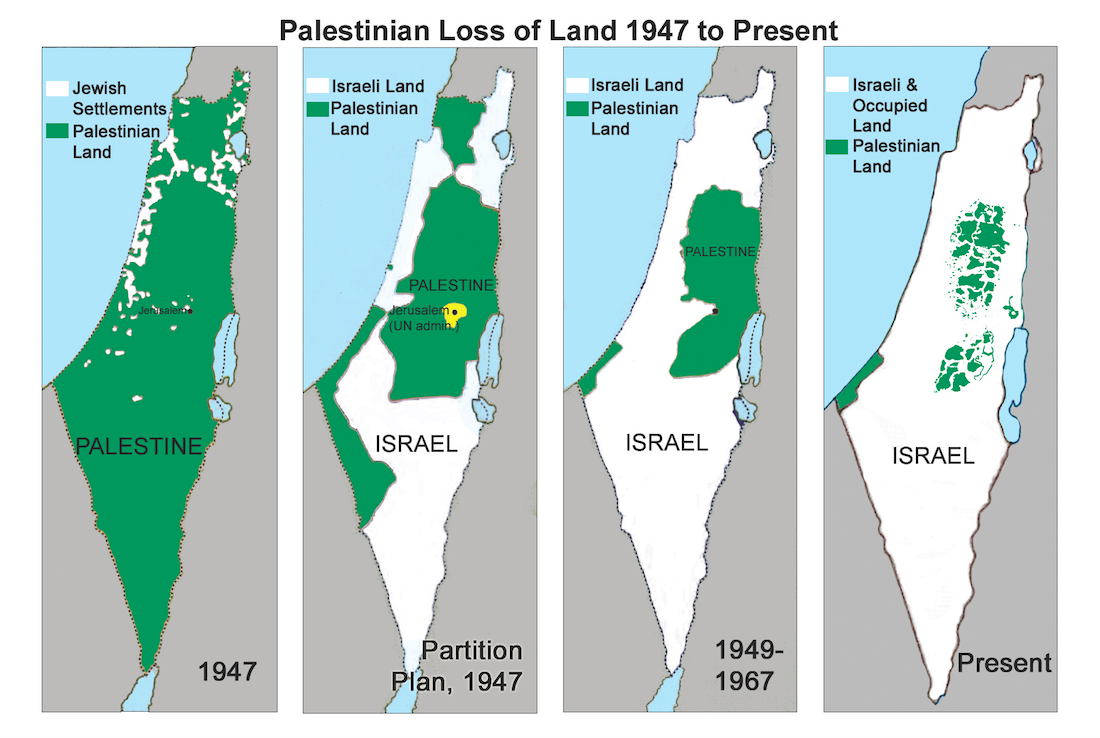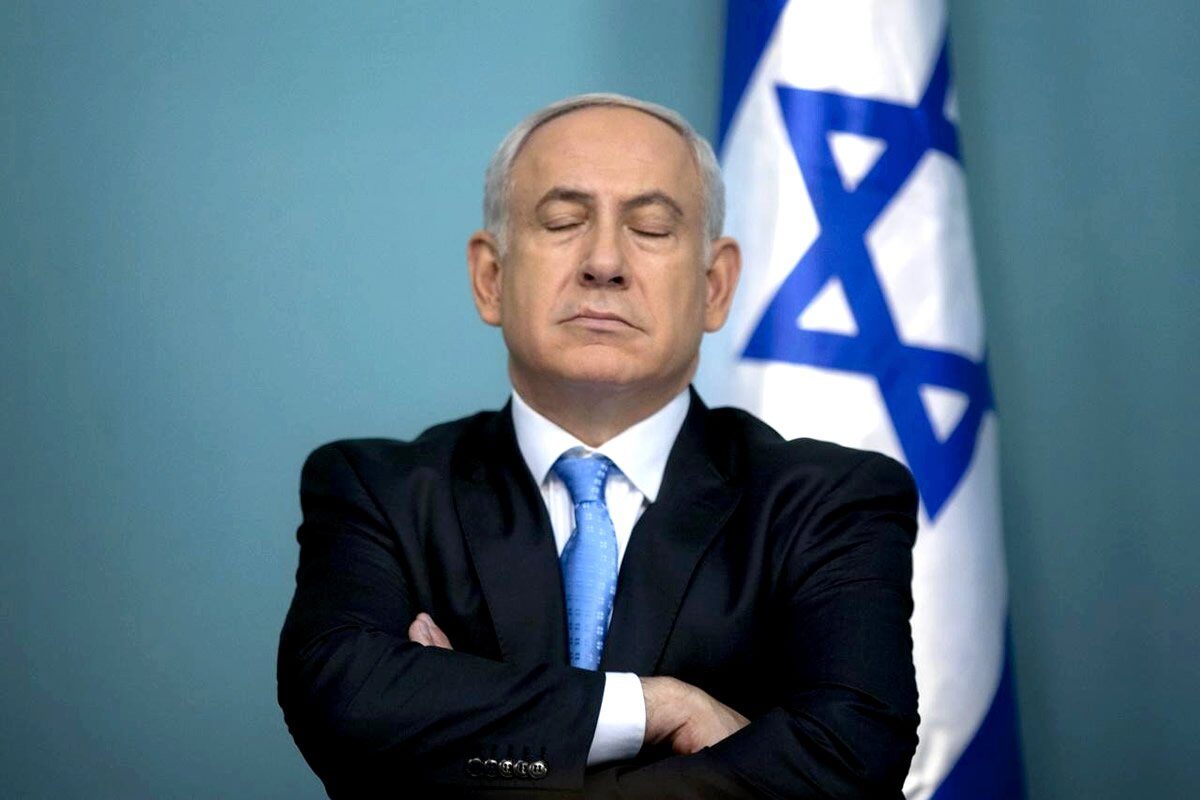THE NONEXISTENT PALESTINIAN STATE. A NEW INTIFADA?

Israel is a militarily strong country, the strongest in the Middle East; it is unrivaled in its region and is backed by the financial and political support of an international Jewish lobby and by the technical-military cooperation of the United States. On top of all this, it owns 80 nuclear warheads.
All of these elements prevent Israel from seeking a negotiable solution to the Palestinian problem. A strong nation doesn’t negotiate, it dictates conditions and is not willing to allow concessions. Politically speaking, this approach is also the current expression of one of the most extremist governments we’ve seen at the helm of Israel.
On the opposite front there is a varied Palestinian community that suffers the situation of subjection with frustration and nurses feelings of revenge; a community that feels defrauded of a right sanctioned by various international resolutions (which were never applied) and watches helplessly as the arrogant occupant works at the daily erosion of any room left for negotiations. The settlements in the occupied territories are, of course, the instrument through which such room is being eroded.
In the Palestinian front there are two opposing trains of thought: there are those that would like to continue to negotiate and those who believe in the armed response.
The lesser the room for negotiations, the stronger the latter group will be. If one doesn’t negotiate, one fights.
A worsening situation
This is the state of play in Israel and in the occupied territories today. It is, of course, short-sighted to think that prevarications can solve a 60-year-old territorial feud. It is short-sighted to think that by winning back Palestinian territories one could obtain that which is not conceded in negotiations. Unfortunately, the co-existence of Israelis and Palestinians is tainted by mistakes on both sides.
It is a social and political cocktail that could explode with the advent of Donald Trump at the presidency of the United States. Even the so-called international brokers – the countries that can force the parts to sit around the negotiating table – are not impartial anymore. And since it seems to be the same with Trump, then in the eyes of the Palestinians there is really no social alternative left but terrorism.
In addition to all this, the United Nations come out of the contest as a club for chit-chat while it is not clear what other international institution could host and guarantee negotiations in its stead. The UN is often regarded as a useful institution when it vetoes the resolutions that we dislike and becomes irrelevant when it decides against us.
The other wars
So far the Palestinian problem has been overlooked internationally due to a number of other emergencies in the region. The ISIS and its crumbling Islamic State; the civil war in Syria; Kurdish terrorism; Erdogan’s about-face politics and the failed coup attempt in Turkey; the war in Yemen; the crawling conflict between Shiites and Sunnis; the confrontation between Iran and the Gulf nations; all of these elements have drawn the attention of international politics and have diverted the attention and interest of the international public opinion from the Palestinian plight.
Israel has used this state of distraction to continue its policy of expropriation of Palestinian territories and the consequent construction of the settlements in areas that should be dedicated to the edification of the Palestinian State.
Yet the history of the Middle East teaches us that nothing is lasting in the region. Crises overlap and elide each other; alliances last the span of a shared interest and then dissolve; friends and foes are interchangeable.
If the relationships of strength were to be measured with today’s parameters, the chances of the Palestinians actually obtaining their own State would be close to zero.
Gaza – where the armed approach prevails – is reduced to a military enclave surrounded by Israel and especially by Egypt, which used to guarantee the military and political survival of Hamas’ claims. The Palestinian National Authority, under the feeble guidance of Mahmoud Abbas, can neither put together the international lobby needed to back the Palestinian expectations, nor adequately confute provocations and prevarications against their interests. The PNA is experiencing intestine political feuds and scandals that cripple the internationally recognized claims of the Palestinians.

Israel and the US
Relationships between the US and Israel have gradually worsened during Obama’s 8-year stretch at the helm. From the initial confrontation on the solution to the Palestinian problem to the inconsistency of the negotiations with inflexible Israel; in time, the contest between Obama and Netanyahu has moved to a personal level. The latter served a number of institutional and political ‘improprieties’ to the US President (both by attempting to hinder the ratification of the nuclear treaty with Iran and by appealing directly to the US Congress and to the Republican opposition in the United States).
In the light of all this, the recent US decision to abstain from voting a UN resolution to condemn the building of new settlements in the Palestinian territories occupied by Israel is understandable (In the past, the US would have vetoed such resolution). The decision to abstain – not veto – is probably also the product of the contest between Trump and Obama regarding international policy, ranging from the relationship with Russia to that with Israel. Trump (and the designated Ambassador to Israel) have promised to move the US embassy from Tel Aviv to Jerusalem, thus sanctioning the Israeli claims on the city.
Presently, the overall situation is seemingly favorable to the nationalistic stance adopted by Natanyahu: the advent of Trump, his clear support of the Israeli claims, the delegitimization of the UN (which has always been an obstacle to Israel’s expansive intents) and perhaps the fact that many of the regional actors don’t seem to be able to counter the decisions of Israel or support those of the Palestinians.
Yet in foreign policy the forcing, unfair and insolent behavior that Israel can adopt today could backfire against its interests tomorrow, both on political and diplomatic levels. And this is not only true of the Palestinian issue, which is subject to the credibility of Israel in the international context and to its contractual power. Israel knows full well that the international public opinion is generally not favorable to its claims.
Meanwhile, the converging interests of Trump and Netanyahu have produced a clash with France and the UK, which ended up voting for the UN resolution to condemn Israel’s settlements.
Israel and Russia
Netanyahu underestimates the fact that Russia is gaining weight in the Middle Eastern theater. And Russia has always sided with the Palestinians. Once the Syrian issue is solved (in Russia’s favor, of course) and the ISIS is defeated, Moscow will be able to condition decisions and alliances in the region more-so than the United States.
The fact that Trump and Putin agree on many issues today should not reassure the Israeli Prime Minister. There will come a time when the two superpowers will get on a collision course because the interests of one cross those of the other amid the contest for world hegemony that divides them.
The relationship with Russia is paramount in the perspective of a new order in the Palestinian issue. The war in Syria facilitated the security agreements between Tel Aviv and Moscow which served the purpose of avoiding incidents between the two armed forces. Israel has thus been able to deliver aerial raids on Hezbollah targets in Syria, even in the presence of the Russian army (the air strike against the Shiite Zahara and Nubl training camps in August and against the Mezzeh airport in November 2016).
The two countries – Russia and Israel – have maintained diplomatic relationships for the past 25 years. Putin and Netanyahu get along just fine (Israel recently abstained from supporting UN sanctions against Russia) and various ministers in the Israeli government (including the Defense minister) speak Russian. Yet it is but a momentary tactical convergence; a wedding of convenience, not of love. The two countries are destined to return on opposite sides of the barricade sooner or later.
The future is uncertain
On top of all this, there are the proxy wars. After Syria will be pacified and subdued – as it was in the past – to Russian interests, the Palestinian diaspora and the more intransigent Palestinian factions, which were supported by Assad, will have more time on their hands to fight Israel. And although their numbers were limited this far, in the future, the frustration of the population living in the occupied territories will produce numerous new recruits.
In addition to this, there are the Hezbollah militias that are currently fighting for Assad. These combatants have amassed military experience that will come in handy in their future confrontation against Israel. It is a well known fact that, behind the Hezbollah, there is the hand of Iran.
The Hezbollah demonstrated in 2006 that they are the only military force that can create trouble for Israel.
One could object that the strength and capabilities of the Israeli army could easily overpower the Palestinian factions and the Lebanese Shiites, but the scenario we speak of is not that of a conventional war but rather an asymmetrical warfare coupled with terrorism; a crawling war of attrition that could in no way guarantee peace and security for the Israeli state. Insecurity will be the price that the Israelis will pay if the issue remains unsolved.

Benjamin Netanyahu
There shall be no accord
In the light of what we see today, there exist no margin for a negotiated agreement between the parts at war. Israel has no desire to negotiate because the outcome of such negotiations would inevitably be the birth of two distinct States, as stated by the UN resolution of 1967, and a territorial concession on the part of Israel.
In his last electoral campaign, Netanyahu stated that there would be no Palestinian State under his rule.
But what alternative solutions are there, apart from the Bantustan/apartheid option that the Palestinians will never accept?
Security in exchange for a Palestinian State?
Is it a feasible solution? Yes, if there is a political will to negotiate on the part of Israel. Yes, if the Palestinians make room for the security needs of their counterpart.
The only solution is a compromise that is acceptable by both parties.
The terrorist attacks
The latest attack in Tel Aviv is dated January 8 and was carried out in a manner that is typical of the ISIS (a truck that plunges into a crowd of people, like in Nice and Berlin. But the same is true of the previous attacks at a market on June 8 and at a bar on January 1st 2016). It is but a first taste of what could come. Netanyahu immediately blamed the ISIS for the attack, perhaps in an attempt to put the Palestinian claims on the same level as those of Al Baghdadi’s ruthless militias.
There is certainly a collusion of intent and an operative resemblance between the two ‘wars’. Hamas is, after all, the faction of Palestinian combatants that is closest to Islamic extremism. But the Palestinian problem is antecedent to that of the ISIS and has its own reasons and dynamics.
Unfortunately, if there will not be room for a negotiated solution, the only option left to the Palestinians will be that of the armed fight, of terrorism.
There was a first intifada in 1987, a second one in 2000 and a third in October 2015. Maybe a fourth intifada is due, the fight escalating from stones to knives to trucks.
Netanyahu’s policy is conditioned by the coalition that he presides within his government. Netanyahu’s Likud party (which he transformed to embrace more extreme positions) is the ally of extremist and nationalist parties such as the Bayit Yehudi, Shas and the United Torah Judaism and as such needs to support extremist stances and polarize the concept of security itself.
Weapons of mass distraction
Netanyahu is currently fighting a battle for his own political survival as well. He is faced with accusations of corruption (illegal funding for his campaign) and has to stand trial for them. He knows full well that in Israel even former Presidents can be landed in prison, as was the case with Moshe Katsav and his predecessor, Ehud Olmert. During his previous mandate in 1996-99, Netanyahu was investigated for receiving gifts and for spending public money for his own, private, expenses.
His rigidity with regards to the Palestinian issue is on the one side a weapon of mass distraction and on the other a way to win the solidarity of the political parties that support his leadership. Netanyahu is currently trying to turn the investigation on his spending into an example of political persecution against his public persona. Unfortunately for the Prime Minister, there exists no parliamentary immunity in Israel.
The circumstances above all concur to make the solution to the Palestinian problem harder to find.
As for Hamas, it has been sensibly weakened by the siege on Gaza and by the population’s poverty. These factors, coupled with the brutality of Hamas’ militants have lessened support for the organization. A crawling intifada could be useful for Hamas because it would distract the population from their daily difficulties.
The Pope’s appeal
Pope Francis’ January 2017 statements also confirm that the Israeli-Palestinian situation is worsening. The Catholic Church, which is very interested in what happens to the ‘holy land’, launched an appeal to facilitate the reprise of dialog that can lead to a solution and guarantee the co-existence of the two people. A stable and enduring situation of peace.
The most significant passage of the Pope’s statements is a plea to the parts to prevent the fighting from becoming a habit; something that they cannot live without.
A UN resolution following the war of 1967, the Oslo accords in 1994 (and an infinite series of initiatives, mediations, etc.), the existence of two distinct States, all of these have remained but words typed on a sheet of paper. The parties at play are partially to blame for this, as are the countries that couldn’t or wouldn’t let these accords be applied.
Impunity makes a solution harder to find
The parties at war are convinced that any decision arising from the international community has no binding value; that the UN is not influential and that there exists a sort of international impunity for their crimes.
Recently there has been talk of a new PLO initiative for a three-year agreement. There is a possibility that it could produce something worthwhile only if Palestine accepts to let the settlements be and if Israel accepts to restore these settlements to the Palestinian jurisdiction. France will also kick-start a new Peace Conference with a wide international presence.
But it seems useless to organize negotiating tables for parties that do not wish to negotiate or to sign agreements between people who don’t plan to respect them.

